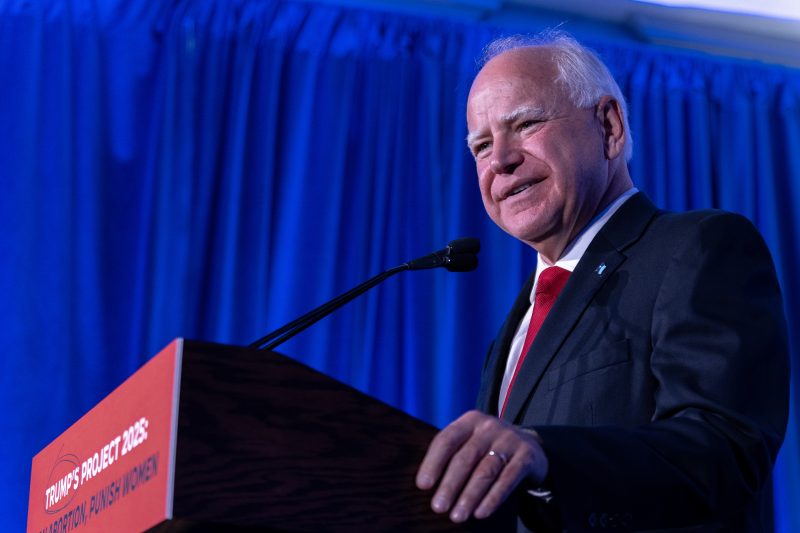Vice President Harris has chosen Minnesota Gov. Tim Walz to be her running mate, opting for a former high school teacher and Midwestern Democrat to complete a newly assembled presidential ticket, her campaign announced Tuesday.
The choice of Walz, 60, creates a ticket that many Democrats have said would be politically beneficial. Harris, 59, who is Black and Indian American and spent much of her career in deep-blue California, chose from a list of finalists populated by White men, including Walz, who have represented more competitive swaths of the country.
The selection culminates an increasingly intensive process in recent days, as the Harris team narrowed down the prospects and various factions of the Democratic Party lobbied for their favorites. Over the weekend, Harris interviewed three finalists: Walz, Pennsylvania Gov. Josh Shapiro and Arizona Sen. Mark Kelly.
Compared with some of the other prospects who Harris considered as potential running mates, Walz is less well-known and has faced less scrutiny on the national stage.
A second-term governor and chair of the Democratic Governors Association, Walz does not hail from a traditional battleground state — Minnesota has supported a Republican presidential candidate only once since 1960. But Walz’s credentials as a veteran and gun owner who previously represented a Republican-leaning, rural part of Minnesota in Congress could help Harris appeal to working-class White voters who have turned away from Democrats and helped fuel Donald Trump’s political rise.
Walz catapulted onto the national radar as it became clear that Harris was considering him for the ticket after Biden ended his reelection bid July 21. He repeatedly criticized Trump and other Republicans as “weird” in cable news appearances, an unusual formulation that attracted attention. Other Democrats followed with the same line of attack, which appeared to strike a nerve in some Republicans, who have felt compelled to push back.
Walz now faces the urgent task of introducing himself to the country with about three months left before an election that has already been rocked by historic turmoil. The political tests ahead include a potential debate against Sen. JD Vance (R-Ohio), whom Trump tapped as his running mate in July.
Harris will hold her first rally with Walz on Tuesday in Philadelphia, the first stop in a four-day tour of battleground states that includes visits to Michigan, Wisconsin, Nevada and elsewhere.
Harris’s choice of a running mate was among the most closely watched decisions of her fledgling campaign, as she sought to bolster the ticket’s prospects for victory in November and rapidly find someone who could be a governing partner. In picking Walz, she has selected a seasoned politician with executive governing experience, and signaled the importance of Midwestern battleground states such as Wisconsin and Michigan.
Walz’s foray into politics came later in life: He spent more than two decades as a public school teacher and football coach, and as a member of the Army National Guard, before running for Congress in his 40s. In 2006, he defeated a Republican to win Minnesota’s 1st Congressional District — a rural, conservative area — and won reelection five times before leaving Congress to run for governor.
Walz was first elected governor in 2018 and handily won reelection in 2022. He emerged publicly as one of the earliest names mentioned as a possible running mate for Harris, and in the ensuing days he made the rounds on television as an outspoken surrogate for the vice president.
“These are weird people on the other side. They want to take books away, they want to be in your exam room. … They are bad on foreign policy, they are bad on the environment, they certainly have no health-care plan, and they keep talking about the middle class,” Walz told MSNBC in July. “As I said, a robber baron real estate guy and a venture capitalist trying to tell us they understand who we are? They don’t know who we are.”
Walz also has faced criticism from Republicans that his policies as governor were too liberal, including legalizing recreational marijuana for adults, protecting abortion rights, expanding LGBTQ protections, implementing tuition-free college for low-income Minnesotans and providing free breakfast and lunch for schoolchildren in the state.
But many of those initiatives are broadly popular. Walz also signed an executive order removing the college-degree requirement for 75 percent of Minnesota’s state jobs, a move that garnered bipartisan support and that several other states have also adopted.
“What a monster. Kids are eating and having full bellies, so they can go learn, and women are making their own health-care decisions,” Walz said sarcastically in a July 28 interview with CNN when questioned on whether such policies would be fodder for conservative attacks, later adding: “If that’s where they want to label me, I’m more than happy to take the [liberal] label.”
Walz also spoke at a kickoff event in St. Paul for a Democratic canvassing effort, casting Trump as a “bully.”
“Don’t lift these guys up like they’re some kind of heroes. Everybody in this room knows — I know it as a teacher — a bully has no self-confidence. A bully has no strength. They have nothing,” Walz said at the event, sporting a camouflage hunting hat and T-shirt.
Walz has explained that he felt some Democrats’ practice of calling Trump an existential threat to democracy was giving him too much credit, which prompted his decision to denounce the GOP nominee instead as being “weird.”
“I do believe all those things are a real possibility, but it gives him way too much power,” Walz said on CNN’s “State of the Union” regarding the Democrats’ rhetoric. “Listen to the guy. He’s talking about Hannibal Lecter, shocking sharks, and just whatever crazy thing pops into his mind.”
Walz was rewarded for his willingness to attack the Trump-Vance ticket and his embrace of the liberal label, earning the endorsement of a coalition of left-leaning groups that touted him as “a credible and respected voice that has a track record of winning over and exciting an electorate, especially the ability to turn out young voters, immigrants, and independents in swing states.”
If Walz is elected vice president, under state law, Minnesota Lt. Gov. Peggy Flanagan (D) would assume the governorship for the rest of his term. Minnesota Senate President Bobby Joe Champion, a Democrat, would become lieutenant governor. Minnesota law would not require Walz to resign from his office in order to run for vice president. The state also does not have term limits for governors.
In picking Walz, Harris passed over several other Democratic governors who were under consideration, including Shapiro, Andy Beshear of Kentucky and J.B. Pritzker of Illinois.
Harris faced an effective deadline of Aug. 7 to select a running mate. That is when Democratic National Committee officials had hoped to formally nominate its ticket to avoid running afoul of ballot qualification deadlines in various states.
Michael Scherer and Patrick Svitek contributed to this report.








